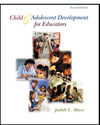 Child and Adolescent Development for Educators, 2/e Judith Meece,
University of North Carolina - Chapel Hill
Student Study Guide by Nancy Defrates-Densch
Cognitive Development: Piaget's and Vygotsky's Theories
Learning ObjectivesAfter studying this chapter, you should be able to:
| Describe a constructivist approach to teaching and discuss its underlying proposition. |
 |  |  | | Define the three types of knowledge proposed by Piaget and describe how knowledge is organized. |
 |  |  | | Describe the two major principles of development of Piaget's theory of development and give examples of assimilation and accommodation. |
 |  |  | | Identify the four factors from Piaget's theory which contribute to children's cognitive development. |
 |  |  | | Outline Piaget's four stages of development and identify what develops at each stage. |
 |  |  | | Discuss criticisms of Piaget's theory and current research related to it. |
 |  |  | | Describe children's abilities to understand the perspective of others at different stages of development. |
 |  |  | | Define adolescent egocentrism and describe two important aspects of it. |
 |  |  | | Discuss major curriculum reforms that have occurred as a result of Piaget's research on children's intellectual development. |
 |  |  | | Describe Vygotsky's theory of cognitive development and discuss why it represents a cultural-historical perspective of children's development. |
 |  |  | | Identify psychological and technical tools for thought and describe how they are used in thought processes. |
 |  |  | | Describe the three stages of development in children's use of language. |
 |  |  | | Define the zone of proximal development and describe how teachers and parents working within the zone of proximal development can move children to a higher level of functioning. |
 |  |  | | Identify similarities and differences between Piaget's and Vygotsky's theory of development. |
 |  |  | | Describe the role of private speech in learning. |
 |  |  | | Define and describe the processes of guided participation and scaffolding. |
 |  |  | | Describe the reciprocal teaching model and identify how it relates to Vygotsky's theory of cognitive development. |
 |  |  | | Describe the role of peer interactions from the perspectives of Piaget's and Vygotsky's theories. |
| 


 2002 McGraw-Hill Higher Education
2002 McGraw-Hill Higher Education